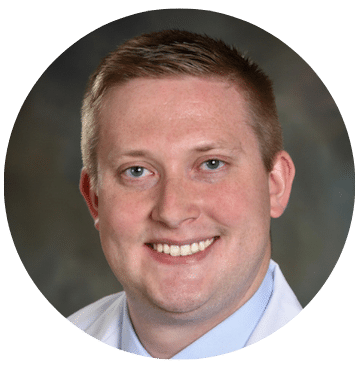Researcher Spotlight: Jason Romancik, MD
Emory University – Winship Cancer Institute

Follicular lymphoma (FL) is typically a slow-growing
or indolent form of non- Hodgkin lymphoma (NHL)
that arises from B-lymphocytes, making it a B-cell
lymphoma. FL is generally very responsive to radiation
and chemotherapy, and most times radiation alone
can provide a long-lasting remission (disappearance of signs and symptoms) in some patients with early-stage disease. Dr. Jason Romancik’s LRF research project focuses on conducting a clinical trial investigating two targeted, non-chemotherapy medications obinutuzumab (Gazyva) and acalabrutinib (Calquence) – for the first-line
treatment of FL. “We hope that in addition to inducing prolonged remissions, this regimen will be well-tolerated and will delay the need for treatment with conventional chemotherapy,” he states. He proposes to assess the quality of life and side effects using patient-reported outcome (PRO) questionnaires to capture health outcomes directly from the patient who experienced it as opposed to those reported by the physician or other members of the treatment team. “These assessments will help us better define the risk/benefit profile of this regimen and will help us to determine whether or not to pursue this combination further as a first-line treatment regimen in follicular lymphoma,” he explains.
Dr. Romancik received his MD at Rush Medical College and completed his residency at Washington University in St. Louis/Barnes-Jewish Hospital. He is currently a third-year hematology/oncology fellow at Emory University pursuing a career as a clinical researcher in malignant hematology, focusing on lymphoma. Dr. Romancik was drawn to lymphoma due to the vast array of therapies used to treat the disease. “We utilize everything from chemotherapy, immunotherapies, and novel oral agents to bone marrow transplant and CAR T cells,” says Dr. Romancik. “I am drawn to the fact that as lymphoma specialists, we can become experts in all these treatment modalities while building strong relationships with patients to help guide their care over the course of their disease.”
His career goal is to become an independent clinical researcher leading clinical trials in cell therapy and bone marrow transplant.“The LSRMP Workshop was an invaluable experience,” he shares. “Working with the panel of lymphoma experts not only improved the design of my current research project but will also improve the quality of my future work as I continue to progress towards becoming an independent clinical researcher.”

